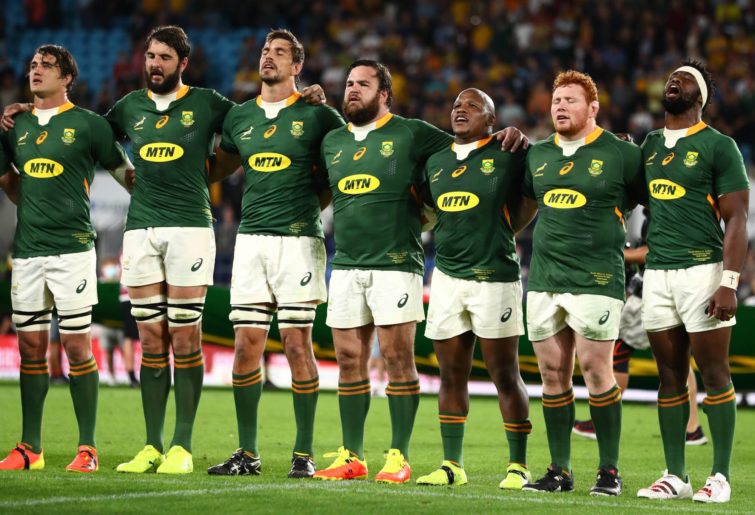The Six Nations has concluded for another year, and a very deserving French team took the honours.
But perhaps the biggest story throughout the duration of the tournament has been the debate surrounding Italy’s place in the tournament.
Therefore, what stood out even more than the way France won their tenth grand slam was the Italian victory over Wales at the Principality Stadium.
So the question must be asked: after a monumental losing streak of 36 games (the last win was against Scotland in 2015), will this victory quieten those who believe Italy should be dropped?
Since Italy joined the Six Nations in 2000, there have been four winners: England (seven times), France (six times), Wales (six times), and Ireland (four times).
In 2000, Italy had a win against Scotland. In fact, most of Italy’s 12 tournament wins have been against Scotland – seven in fact. They have now beaten Wales three times, France twice and Ireland once.

Italy celebrate their drought-breaking victory over Wales. (Photo by Bob Bradford – CameraSport via Getty Images)
The only team Italy hasn’t beaten is England – although they did scare England in 2017 with their non-contesting of the scrums in what was described as “psychologically… Italy’s day”. There have even been two occasions where Italy had two wins in one tournament – 2007 and 2013.
While it’s true Italy have won the wooden spoon on 17 occasions, they have been fifth on four occasions (2003, 2004, 2012, 2015) and fourth on two occasions (2007, 2013).
So, who else has won the wooden spoon in the Six Nations? Well, Scotland on four occasions (2004, 2007, 2012, 2015), and both Wales and France once (2003 and 2013 respectively).
Only England and Ireland haven’t had the wooden spoon since Italy joined the tournament in 2000.
Looking at the history of the tournament, in all its various formats, Ireland have been wooden spooners on 25 occasions, Scotland 24 times, England 19 times, both Italy and Wales 17 times and France 13 times.
Granted, most of these wooden spoons, except for the Italian ones, were in the days of the Home Nations (1883 to 1909, 1932 to 1939) and Five Nations (1910 to 1931, 1940 to 1999), but they’re still in the record books.
Also, important to note is France’s record when they first joined the Five Nations. In their first year (1910) they lost all their matches. In comparison, Italy lost all but one in their first year.
The following year they won one match and from 1912 to 1914, they lost all their matches – that’s 18 losses from 19 matches (a 95 per cent loss rate).
From 1920 to 1931 (there was no Six Nations from 1915 to 1919 because of World War One), France lost 35 of their 48 matches (a 73 per cent loss rate).
So their first 17 years in the Five Nations, before being expelled in 1932 due to allegations of professionalism, earned them a 79 per cent loss rate (53 losses from 67 games).
Yes, Italy have worse stats for the same timeframe – in their first 17 years, they lost 72 of their 85 games (an 85 per cent loss rate) – but it’s only a difference of six per cent, so the gap isn’t as large as some people think.
There’s been a lot in the media of late about replacing Italy in the Six Nations. The latest round of the perennial debate hit the headlines in February after an article was published in The Mirror about South Africa replacing Italy in the tournament in 2025.

(Photo by Chris Hyde/Getty Images)
The article claimed “The move is reportedly being pushed by CVC, who bought a one seventh stake in the tournament for £365 million”.
However, what was missing from the article is the fact that Italy are also stakeholders. Referring to the agreement between Six Nation Rugby Limited and CVC, former IRFU CEO Philip Browne asserted the unions will “retain complete control of all sporting matters”.
This is course means that “Italy would be able to veto South Africa joining the Six Nations at their expense”.
South Africa joining would “require unanimous agreement from the seven shareholders — Italy, England, France, Ireland, Scotland, Wales and private equity firm CVC” and that might be a hard sell.
The only other way into the competition for SA is for expansion, and that “would cause enormous rows between clubs and countries because of the extra matches and would require World Rugby to organise a longer player-release window”.
So either avenue isn’t as clear cut as many of the reports suggest.
Of course, the $24 million question is, if expansion is the best option, who should be invited to join?
The news has been inundated with the merits of South Africa joining, but there’s been quite a bit of opinion opposed to that.
In a poll on ruck.co.uk, the most popular scenario is leaving the competition the way it is (34 per cent), with introducing promotion and relegation (31 per cent) the second favourite option. As for a country being added, 20 per cent voted for Georgia while only 12 per cent voted for South Africa. These opinions are mirrored by many pundits.
However, for Xander Chevallier, the promotion/relegation option is amiss: “The Six Nations is a tournament, not a league. There does not have to be a constant chopping and changing from it. Many tournaments across sport, and particularly rugby, have fixed opponents. One of the beauties of the Six Nations is that it is built upon sporting rivalries and risking removing these would be a huge mistake”.
He also discussed how Italy had had “good results against France, Scotland, Wales and Ireland” when they joined, and “Although Georgia do often win the Rugby Europe Championship, they have not had any noticeable results against full strength Tier 1 sides”.

(Levan Verdzeuli/Getty Images)
There are obviously pros and cons to modifying the Six Nations, but why fix what isn’t broken?
The tournament is a great advertisement for rugby, providing an exciting spectacle with the “highest average attendance in world sport”.
And if a team were to be added, should it not be a team without current membership in a Tier 1 tournament? Isn’t one of the objectives of World Rugby to grow the sport, rather than kowtow to Tier 1 nations?
In March, Rassie Erasmus admitted, “he’d love to see the Springboks trade the Rugby Championship for the Six Nations”, but as they “are locked in with the Rugby Championship until 2025, so for now it is still hypothetical”.
However, in November 2020, according to Sanzaar, “South Africa committed itself to the Rugby Championship until 2030”.
According to Sanzaar CEO Andy Marinos, “The re-commitment by the four unions to the long-term future of the international game is an important start as we embark in a new direction for both the unions and the organisation over the coming years”.
Marinos added, “Any talk of a change to the stakeholder relationship and partners withdrawing, creation of new teams in new markets and Trans-Tasman competitions is unsubstantiated speculation and simply wrong”.
So it’s difficult to know what the reality is.
But the bottom line is, Italy are Six Nation stakeholders and as such, deserve to be there. They are building nicely, and their under-18 and under-20 teams have been competitive of late. And that’s hardly just a problem for Italy.
For Kieran Crowley, “The positive thing about [the victory versus Wales] is they kept playing and kept believing”.
And after a week of having to ignore the noise surrounding their Six Nations status, that couldn’t have been easy.































































































